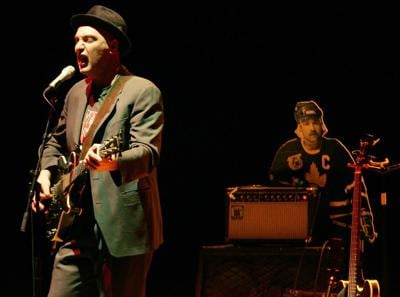TIFF loves and needs and wants its stars. That’s fine. Yet while the event sometimes brings out the rube in us — we fawn over (mostly) imported famous people, playing migratory Hollywood for a fortnight — its squeeing lineups and hot secret parties belie how many personal histories have been wound up in the festival, how many lives have been brought together, informed and shaped by it.
My life changed at the 1980 iteration, when it was still called the “Festival of Festivals.” I was reporting for the Sunshine News, a national high-school newspaper. Even though I had a press pass, I went only to screenings that promised pop candy: “Let There Be Rock,” by AC/DC; “Union City,” with Debbie Harry; and “The Divine Miss M,” by Bette Midler, who, in the reporters’ pool, approached this adorable cub writer, leaned over in all her florid glory and kissed me on the cheek, perhaps pinching it, too, though I might’ve dreamed that last part.
Still, her kiss was a benediction because, a few days later, when I was sitting in the lobby of the New Yorker Theatre after the AC/DC movie, someone I recognized as the famous concert promoter Gary Topp approached me. My stomach somersaulted as I recalled that, a few months prior, I’d sent Topp and his business partner, Gary Cormier, a demo cassette that an early version of the Rheostatics had recorded. Topp sat down, folded his hands and told me that he’d called me at home to offer us a gig at the Edge — the Taj Mahal of New Wave, for kids of my generation — and that my mom had said I was watching movies downtown. He did the math and chanced it that I might be where I was.
The following month, we played the show, our first-ever gig. Forty-five years later, here we are.
Back in 1980, the Rheostatics had no records to our name, but after 14 years, we’d made a bunch. In 1994, a film for which we’d recorded the original music — Richard J. Lewis’s Whale Music, with a screenplay by Paul Quarrington, who’d based it on his own novel — was TIFF’s opening-night movie, screened at the grand Uptown Theatre, on Yonge Street. It was a high-water mark for us, partly because of the creative freedom of the job — we composed music for the film’s main character, Desmond Howl, before shooting started, as a lot of the scenes were about him inventing the work — and partly because we felt as if we’d entered an elevated world. We moved among Norman Jewison, Martha Burns, Saul Rubinek, Maury Chaykin, Patricia Rozema, Atom Egoyan and other artists who’d made an enormous mark on their country.
There we were, throwing down canapes and flutes of bubbly during the opening-night party at the ROM, when someone put on our varied-tempo music. I remember looking up at two hired dancers who’d been swivelling on faux-ancient plinths to party music. One turned to the other and mouthed the words: “I ... can’t ... dance ... to ... this.” Still, at the screening, producer Robert Lantos introduced us out of the crowd, and we felt like a big deal. One of the gifts of TIFF is that it occasionally lets working artists feel a part of the brilliant swim, and that’s how it was for us.
Six Septembers later, we were sitting in Paul Quarrington’s backyard in Riverdale with the Irish writer Roddy Doyle, whom I’d gotten to know through his wife, Belinda Moller, who, in 1988, handed me a novel her then-boyfriend had written — The Commitments — and said, “It’s about music; you might like it.” Roddy was at TIFF, screening a film he’d written called When Brendan Met Trudy. That June, my wife and I had had our first child, and we dared to bring her to the screening, but she stayed quiet and mostly slept, and, as new parents, we got to have a day out at the movies. It was our first festival as a family.
Next week, we’ll return to TIFF together with our daughter. Twenty-five years after slumbering through Roddy’s film (he didn’t take it personally), she will celebrate her work with the rest of the crew of Tuner, Daniel Roher’s dramatic feature, which screens Monday afternoon. Our life, her life, the festival’s life — each has been framed by what is, despite TIFF’s preoccupation with celebrity, the festival’s true charm: its ability to sunny up the lives of movie lovers, artists and families in a city that needs its cultural signposts.
That’s why it’s worth remembering that TIFF isn’t just about the films. It’s about the people who made them, and the people who made those people, and what a gift it is that we can all watch together.
Error! Sorry, there was an error processing your request.
There was a problem with the recaptcha. Please try again.
You may unsubscribe at any time. By signing up, you agree to our and . This site is protected by reCAPTCHA and the Google and apply.
Want more of the latest from us? Sign up for more at our newsletter page.


























To join the conversation set a first and last name in your user profile.
Sign in or register for free to join the Conversation